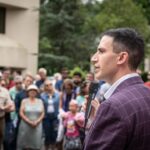Parents: Public School and Homeschool are Not Your Only Options
Parents all over the country have been pulling their children out of traditional public schools due to their concerns of indoctrination, propaganda, and politics in the classroom.
Whether that is teaching gender ideology and/or critical race theory, keeping kids out of the classrooms during the COVID-19 pandemic, or allowing troublesome kids to cause problems, many parents do not want their children in these schools.
Where do these students end up?
A response I hear often when parents pull their children out of traditional public school is: “Homeschool your kids.”
As much as I admire families that homeschool, it does not work for every family. Many households have both parents working, others may be single parents, or an environment might not be the best for a child.
Homeschool is a great alternative to traditional public schools, and you can be sure of what your child is learning. I have also seen many of these children have opportunities by joining co-ops, participating in extracurricular activities, and traveling frequently.
Some of the most intelligent and talented kids I know were homeschooled, and they were prepared for the real world. They even end up holding strong to their faith and beliefs. Unfortunately, I have also seen some homeschoolers crash and burn when they become adults, and they even resent their families and traditions.
However, homeschool should not be the only option for families. They need to be informed of all their options and find a school that works best for them and their children. If they are concerned about what their children are learning, it is important for them to find a school where they can have that involvement in their children’s studies. Many non-traditional public schools are typically more accountable to parents.
Some of these options include charter schools, private schools, and more recently, innovative models such as microschools and pod schools. While many parents may know what charter and private schools are, they may not have heard of the latter two options.
Microschools and pod schools can be seen as a “mid-point” between private schools and homeschools, and they tend to find ways to customize learning experiences that cater to specific needs of individual students. Some of these schools operate as private schools or learning centers with full-time or part-time options for homeschoolers. These schools tend to be a decentralized form of learning, and they are usually started up by parents or former public, charter, and/or private school teachers.
I do realize that rural areas might not have as many options, and only traditional public schools are available. For them, the only alternative may be to homeschool, but there are opportunities to build more learning options. There are also rural microschools and pod schools.
Unfortunately, cost may also be a concern to parents, but states have been passing legislation to give money back to the parents and enable them to have their children in a learning environment that works for them. No matter the income, learning abilities, or background, all children have a chance to get the best education that caters to their individual needs.
No matter where a parent has their children attend, it is still their job to instill values by teaching them how to learn and think for themselves. Parents will not be able to shield their children from all indoctrination and propaganda, so it is important to have them prepare their children to face the world.
Homeschool is not the only option after parents pull their kids from traditional public schools. They should be informed of their options and keep schools accountable regardless of where they send their children.




